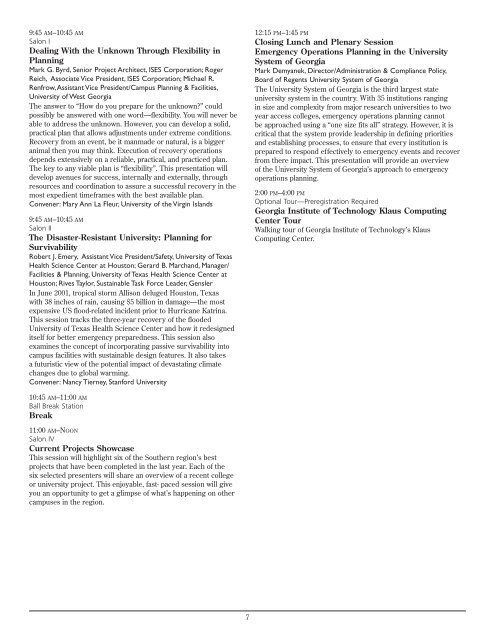Disaster Relief: How Do You Prepare for the Unknown? - Society for ...
Disaster Relief: How Do You Prepare for the Unknown? - Society for ...
Disaster Relief: How Do You Prepare for the Unknown? - Society for ...
You also want an ePaper? Increase the reach of your titles
YUMPU automatically turns print PDFs into web optimized ePapers that Google loves.
9:45 am–10:45 am<br />
Salon I<br />
Dealing With <strong>the</strong> <strong>Unknown</strong> Through Flexibility in<br />
Planning<br />
Mark G. Byrd, Senior Project Architect, ISES Corporation; Roger<br />
Reich, Associate Vice President, ISES Corporation; Michael R.<br />
Renfrow, Assistant Vice President/Campus Planning & Facilities,<br />
University of West Georgia<br />
The answer to “<strong>How</strong> do you prepare <strong>for</strong> <strong>the</strong> unknown” could<br />
possibly be answered with one word—flexibility. <strong>You</strong> will never be<br />
able to address <strong>the</strong> unknown. <strong>How</strong>ever, you can develop a solid,<br />
practical plan that allows adjustments under extreme conditions.<br />
Recovery from an event, be it manmade or natural, is a bigger<br />
animal <strong>the</strong>n you may think. Execution of recovery operations<br />
depends extensively on a reliable, practical, and practiced plan.<br />
The key to any viable plan is “flexibility”. This presentation will<br />
develop avenues <strong>for</strong> success, internally and externally, through<br />
resources and coordination to assure a successful recovery in <strong>the</strong><br />
most expedient timeframes with <strong>the</strong> best available plan.<br />
Convener: Mary Ann La Fleur, University of <strong>the</strong> Virgin Islands<br />
9:45 am–10:45 am<br />
Salon II<br />
The <strong>Disaster</strong>-Resistant University: Planning <strong>for</strong><br />
Survivability<br />
Robert J. Emery, Assistant Vice President/Safety, University of Texas<br />
Health Science Center at Houston; Gerard B. Marchand, Manager/<br />
Facilities & Planning, University of Texas Health Science Center at<br />
Houston; Rives Taylor, Sustainable Task Force Leader, Gensler<br />
In June 2001, tropical storm Allison deluged Houston, Texas<br />
with 38 inches of rain, causing $5 billion in damage—<strong>the</strong> most<br />
expensive US flood-related incident prior to Hurricane Katrina.<br />
This session tracks <strong>the</strong> three-year recovery of <strong>the</strong> flooded<br />
University of Texas Health Science Center and how it redesigned<br />
itself <strong>for</strong> better emergency preparedness. This session also<br />
examines <strong>the</strong> concept of incorporating passive survivability into<br />
campus facilities with sustainable design features. It also takes<br />
a futuristic view of <strong>the</strong> potential impact of devastating climate<br />
changes due to global warming.<br />
Convener: Nancy Tierney, Stan<strong>for</strong>d University<br />
12:15 pm–1:45 pm<br />
Closing Lunch and Plenary Session<br />
Emergency Operations Planning in <strong>the</strong> University<br />
System of Georgia<br />
Mark Demyanek, Director/Administration & Compliance Policy,<br />
Board of Regents University System of Georgia<br />
The University System of Georgia is <strong>the</strong> third largest state<br />
university system in <strong>the</strong> country. With 35 institutions ranging<br />
in size and complexity from major research universities to two<br />
year access colleges, emergency operations planning cannot<br />
be approached using a “one size fits all” strategy. <strong>How</strong>ever, it is<br />
critical that <strong>the</strong> system provide leadership in defining priorities<br />
and establishing processes, to ensure that every institution is<br />
prepared to respond effectively to emergency events and recover<br />
from <strong>the</strong>re impact. This presentation will provide an overview<br />
of <strong>the</strong> University System of Georgia’s approach to emergency<br />
operations planning.<br />
2:00 pm–4:00 pm<br />
Optional Tour—Preregistration Required<br />
Georgia Institute of Technology Klaus Computing<br />
Center Tour<br />
Walking tour of Georgia Institute of Technology’s Klaus<br />
Computing Center.<br />
10:45 am–11:00 am<br />
Ball Break Station<br />
Break<br />
11:00 am–Noon<br />
Salon IV<br />
Current Projects Showcase<br />
This session will highlight six of <strong>the</strong> Sou<strong>the</strong>rn region’s best<br />
projects that have been completed in <strong>the</strong> last year. Each of <strong>the</strong><br />
six selected presenters will share an overview of a recent college<br />
or university project. This enjoyable, fast- paced session will give<br />
you an opportunity to get a glimpse of what’s happening on o<strong>the</strong>r<br />
campuses in <strong>the</strong> region.
















